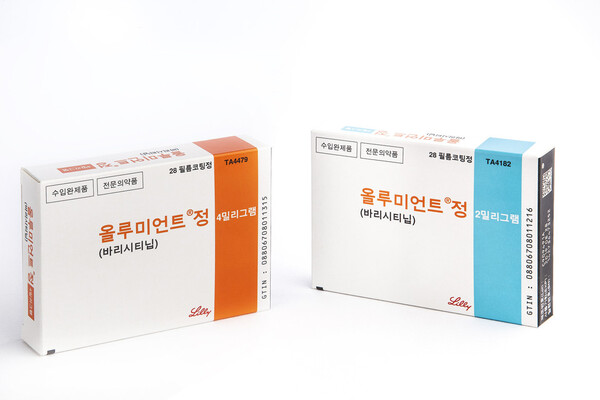Olumiant (baricitinib), Lilly’s oral JAK (Janus kinase) inhibitor, has won approval as the treatment for adults with severe alopecia areata for the first time.

On Thursday, the Ministry of Food and Drug Safety approved Olumiant for adult patients with severe circular hair loss aged 18 and older.
Alopecia areata, or circular hair loss, is a typical autoimmune disorder, which occurs as cells mistake parts of hair as external substances, trigger immune responses and attack hairs, and cause hair to fall without growing, according to doctors.
The prevalence of alopecia areata is 1-2 percent, and people in their 20s and 30s who are most active in social activities account for 40-60 percent of patients. Patients experience difficulty in interpersonal relationships and social life due to changes in appearance. In addition, their quality of life could drop sharply because of psychological problems, including depression and anxiety disorder.
Also, alopecia areata has a high risk of recurrence. If the affected area is wide, like frontal hair loss or universal hair loss, if it occurs at a young age or has progressed for a long time, the prognosis is not good.
There were no approved treatments for alopecia areata before Olumiant, and previously recommended treatments had limited grounds for supporting their effectiveness.
Researchers conducted two randomized, placebo-controlled, phase 3 trials -- BRAVE-AA1 and BRAVE-AA2 -- involving adults with alopecia areata with a severity of alopecia tool (SALT) score of 50 or higher and aged 18 and older. Twelve hundred patients were subject to final analysis. Ten countries participated in the trials, and Korea was included in both studies.
The results were published in the New England Journal of Medicine in May 2022 and selected as one of the notable articles of 2022 by the journal.
The primary endpoint of both studies was the ratio of patients who attained a SALT score of 20 points or less (or 80 percent or more area covered with hair) at week 36. They additionally confirmed Olumiant’s clinical efficacy through 10 secondary endpoints, including scalp hair assessment patient-report-outcome (PRO) or ClinRO Measure for Eyebrow Hari Loss and ClinRO Measure for Eyelash Hair Loss.
At week 36, Olumiant showed superiority to placebo concerning effects on hair regrowth. In the BRAVE-AA1 study, the Olumiant group’s rate of attaining a SALT score of 20 points or lower was 38.8 percent (4mg) and 22.8 percent (2mg), showing statistically significant result compared to the control (placebo) group’s 6.2 percent.
In the BRAVE-AA2 study, the Olumiant (2mg, 4mg) group also showed a significantly higher rate of attaining below 20 SALT points than the place group. Also, the result of major secondary endpoints of the Olumiant (4mg) group supported primary endpoint results.
During 36 weeks, the rate of patients who stopped treatment due to side effects was low, with most treatment-related side effects being mild or moderate. However, a long-term follow-up study is going on to observe abnormal responses resulting from the prolonged administration of Olumiant.
“Severe alopecia areata is a disease that urgently requires medical treatment. However, patients have experienced difficulties, such as limited treatment effects, anxiety and depression, and heavy financial burdens, due to low public awareness and the lack of approved treatments,” said Kim Moon-beom, chairman of the Korean Hair Research Society (KHRS).
Kim noted that his society began to make efforts to improve the treatment environment for alopecia areata patients by revising treatment guidelines.
“With the introduction of a new treatment, we will take the lead in providing correct information so patients can receive the most optimal treatments,” he said.
According to guidelines announced by KHRS last year, for adult alopecia areata patients who have 50 percent or more of their hair, oral JAK inhibitors are recommended as the primary treatment, along with systemic immunosuppressants (full-body steroid ± oral cyclosporin therapy) or contact immunotherapy, diphenylcycloprofenon (DPCP).
Related articles
- GC Genome releases ‘Hair Loss Risk Screen’ test
- Severe disease patients protest to support for hair loss treatment
- Boryung to debut Korea’s 1st spray-type hair loss treatment next Tuesday
- ‘Lilly's Olumiant to benefit Korean patients with alopecia areata hair loss’
- Alopecia areata symptoms, prognosis worse in children under 15

